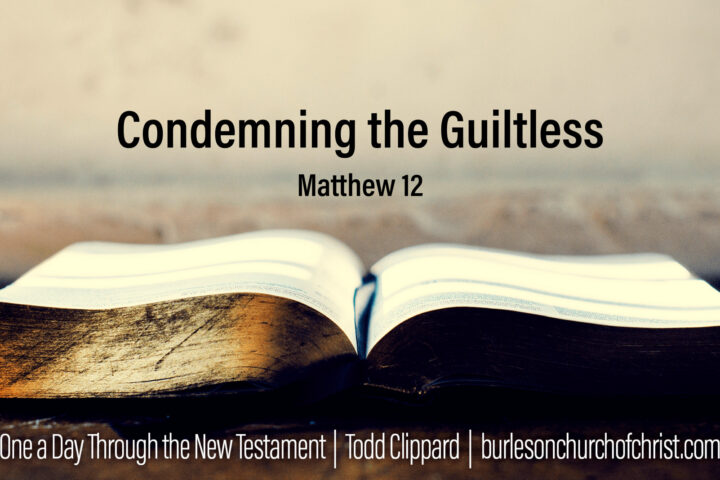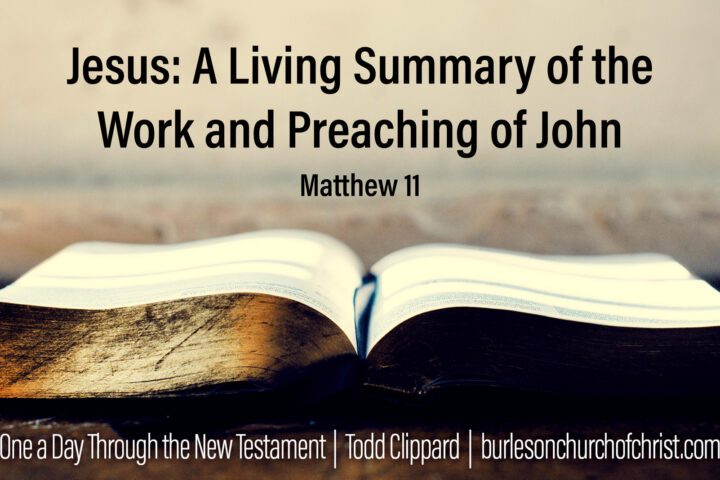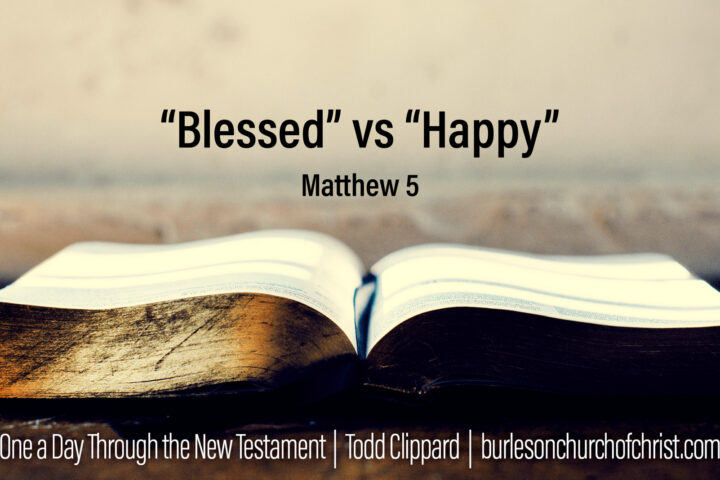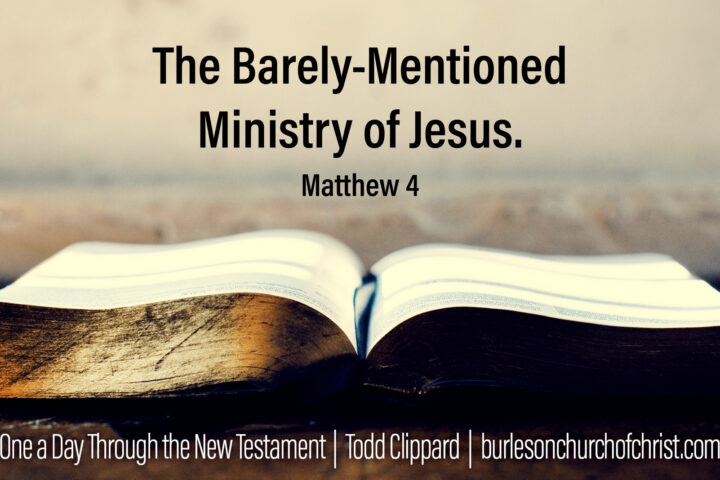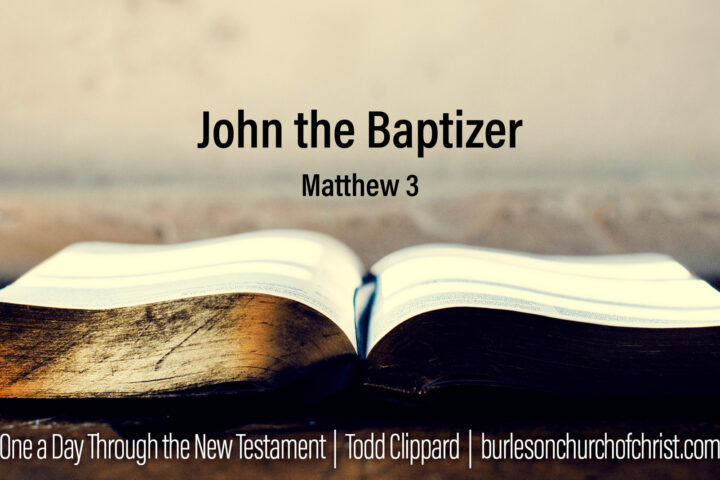Posts from January 2020 (Page 2)
Matthew 12: Condemning the Guiltless
Matthew 12:1-14 illustrates the difficulties associated with the Pharisees’ view of keeping the Mosaic Law. The Law’s specific 613 “Thou shalt” and “Thou shalt not” passages were not clear enough for a stubborn people. Nothing could be left to conscience or personal judgment. The hedges they built around the Law as a safeguard now became considered as laws themselves. Jesus pointed out their hypocrisy and lack of understanding by reminding them of how David and his men actually did something…
Matthew 11: Jesus: A Living Summary of the Work and Preaching of John
Matthew 11 is divided into three distinct sections: the first concerns John the Baptist, the second notes Jesus’ condemnation of the unrepentant cities, and the final section is Jesus’ invitation to rest. In verses 1-6, Jesus reassures John that his faith is not in vain by pointing to the nature of His work and audience. Like His forerunner, and unlike the religious leaders of the day, Jesus lived and worked among the common man, and was gladly accepted by them.…
Matthew 10: Jesus Delegates His Authority and Prepares His Delegates
Matthew 10 is a record of what is commonly called “the Limited Commission.” It is so called because, as opposed to the Great Commission of Matthew 28 and Mark 16 which included the whole world, this sending was only to the house of Israel (vv 5-6). As with any delegated authority, there must be some means of proving that authority. In the days of the Old Testament, one could provide documentation sealed (authorized) with the king’s signet (Est 3:12; Dan…
Matthew 9: Jesus Demonstrates His Power: 2
Matthew 9:1-8 is one answer to using of the thief on the cross as an argument against baptism being necessary for salvation. The first is that the thief died more than a month before Jesus commanded it (cf Mk 16:16). But in this case, we see that Jesus had power on earth to forgive sin (v 6). This power was demonstrated in His healing of the paralytic. One thing that strikes me is the misunderstanding on the part of those…
Matthew 8: Jesus Demonstrates His Power: 1
Matthew 8 is the beginning of a series of events whereby Jesus demonstrates His Divine power in an undeniable fashion. In Matthew 8:1-4 we find the Lord healing a leper. What is particularly moving about this account is the fact that Jesus touched the man to heal him, even though such was completely unnecessary (as we will soon see in verses 5-13). The leper was a pariah among the Jewish populace. The Law of Moses prescribed quarantine for those so…
Matthew 7: Of Hogs and Dogs
“Do not give what is holy to the dogs, nor cast your pearls before swine, lest they trample them under their feet, and turn and tear you in pieces” (Matt 7:6). In Matthew 7:1-5, Jesus condemns unrighteous judgment (cf John 7:24). I believe most agree that those who were often guilty of such were the scribes, Pharisees and other Jewish rulers of the day. They were quick to condemn the guiltless (Matt 12:1-8) without considering their own sins (Matt 23:23-28).…
Matthew 6: Pure Motives
“Brethren, my heart’s desire and prayer to God for Israel is that they might be saved” (Rom 10:1). Paul’s motives in all things were always pure. It is possible to do the right thing with the wrong motive. In so doing one loses all spiritual efficacy with regard to his actions (cf 1 Cor 13:1-3). In today’s text, we see three actions that in and of themselves are good and right, but when done with the wrong motive brings no…
Matthew 5: “Blessed” vs “Happy”
Two thoughts on today’s reading. The first is something I penned a few weeks ago. First, for many years I have heard and read that “blessed” as is found in the beatitudes means “happy.” I just don’t think that is so. The word appears 50 times in the NT and in the is rendered “happy” only 5 times. The other 45 are “blessed,” as in being a recipient of divine favor. In three of the five appearances of “happy,” the…
Matthew 4: The barely mentioned ministry of Jesus.
When thinking of the public ministry of Jesus, I usually think of it as beginning with the Sermon on the Mount. This would not be accurate. Immediately following his baptism and Satan’s temptation in the wilderness, Jesus went to Galilee and dwelled in Capernaum among the Gentiles. Of this period, Matthew says it was the fulfillment of Isaiah 9:1-2. The public life and ministry of Jesus began among the Gentiles, “the people who sat in darkness… and in the region…
Matthew 3: John the Baptizer
John the Baptizer is one of the all-time great characters in all of Scripture. Concerning him, the Lord said, “Among those born of women there has not risen one greater than John the Baptizer…” Because of the way John burst on the scene and his message, many have a rather monolithic view of this great man. Most think of him only in terms of his strange ways and his call of repentance (not unlike the Lord – Matt 4:17, 11:19).…
